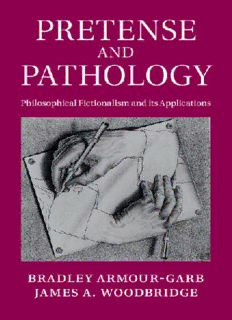Table Of ContentPretense and Pathology
In this book, Bradley Armour-Garb and James A. Woodbridge distinguish
various species of fictionalism, locating and defending their own version
ofphilosophicalfictionalism.Addressingsemanticandphilosophicalpuzzles
thatarise fromordinary language, theyconsider suchissuesas the problem
of non-being, plural identity claims, mental-attitude ascriptions, meaning
attributions,andtruth-talk.Theyconsider“deflationismabouttruth,”explain-
ingwhydeflationistsshouldbefictionalists,andshowhowtheirphilosoph-
ical fictionalist account of truth-talk underwrites a dissolution of the Liar
Paradox and its kin. They further explore the semantic notions of reference
and predicate-satisfaction, showing how philosophical fictionalism can also
resolve puzzles that these notions appear to present. Their critical examin-
ationoffictionalistapproachesinphilosophy,togetherwiththedevelopment
and application of their own brand of philosophical fictionalism, will be of
greatinteresttoscholarsandupper-levelstudentsofphilosophyoflanguage,
metaphysics, philosophical logic, philosophy of mind, epistemology, and
linguistics.
bradley armour-garb is Associate Professor of Philosophy at the
UniversityatAlbany-SUNYandaFellowofWolfsonCollegeattheUniver-
sityofOxford.Heisco-editorofandacontributortoseveralbooks,including
TheLawofNon-Contradiction:NewPhilosophicalEssays(2004),Deflation-
ismandParadox(2005),andDeflationaryTruth(2005).Heisalsotheeditor
ofandacontributortoTheRelevanceoftheLiar(forthcoming).
james a. woodbridge isAssociateProfessorofPhilosophyattheUniver-
sity of Nevada, Las Vegas. He is the author of “Truth as a Pretense” in
FictionalisminMetaphysics(2005).HehasalsopublishedarticleswithBrad-
ley Armour-Garb in journals including Noûs, Philosophy and Phenomeno-
logicalResearch,Analysis,PhilosophicalStudies,andAustralasianJournal
ofPhilosophy,andineditedcollectionssuchasNewWavesinTruth(2010),
RecentTrendsinPhilosophicalLogic(2014),andUnifyingthePhilosophyof
Truth(2015).
Pretense and Pathology
Philosophical Fictionalism and its Applications
Bradley Armour-Garb
and
James A. Woodbridge
UniversityPrintingHouse,CambridgeCB28BS,UnitedKingdom
CambridgeUniversityPressispartoftheUniversityofCambridge.
ItfurtherstheUniversity’smissionbydisseminatingknowledgeinthepursuitof
education,learning,andresearchatthehighestinternationallevelsofexcellence.
www.cambridge.org
Informationonthistitle:www.cambridge.org/9781107028272
©BradleyArmour-GarbandJamesA.Woodbridge2015
Thispublicationisincopyright.Subjecttostatutoryexception
andtotheprovisionsofrelevantcollectivelicensingagreements,
noreproductionofanypartmaytakeplacewithoutthewritten
permissionofCambridgeUniversityPress.
Firstpublished2015
AcataloguerecordforthispublicationisavailablefromtheBritishLibrary
LibraryofCongressCataloguinginPublicationdata
Armour-Garb,BradleyP.,1968-author.
Pretenseandpathology:philosophicalfictionalismanditsapplications/Bradley
Armour-GarbandJamesA.Woodbridge.
pages cm
ISBN978-1-107-02827-2(Hardback)
1. Fictions,Theoryof. 2. Philosophy. I. Woodbridge,JamesA.,author.
II. Title.
BC199.F5A762015
121–dc23 2014042755
ISBN978-1-107-02827-2Hardback
CambridgeUniversityPresshasnoresponsibilityforthepersistenceoraccuracyof
URLsforexternalorthird-partyinternetwebsitesreferredtointhispublication,
anddoesnotguaranteethatanycontentonsuchwebsitesis,orwillremain,
accurateorappropriate.
An entire mythology is stored within our language.
—LudwigWittgenstein,“RemarksonFrazer’sGoldenBough”
Contents
Preface page ix
1 Philosophical fictionalism 1
1.1 Twospeciesoffictionalism 1
1.2 Someimportantaspectsoffiction(or,aminorforayintophilosophy
offiction) 5
1.3 Concernswithcomparativefictionalismquafictionalism 8
1.4 Thecentraltenetsoffictionalism 11
1.5 Fromcomparativefictionalismtophilosophicalfictionalism 18
1.6 Philosophicalfictionalismandotherdistinctionswithinfictionalism 30
2 Semanticpretense-involving fictionalism and existence-talk 39
2.1 Make-believe,representationalaids,andpartiallypretendclaims 39
2.2 Language-worldconnections,long-armconceptualroles,andM-conditions 44
2.3 Typesofpretenseinpartiallypretendclaims 50
2.4 PragmaticPIFanditsproblems 55
2.5 PriorSPIFaccountsandtheEngagementComplaints 60
2.6 OurSPIFaccountofexistence-talk 64
3 Propositional realism and a SPIF account ofproposition-talk 77
3.1 Propositionsandproposition-talk 77
3.2 Benacerraf’schallengesasproblemsforpropositions 79
3.3 OurSPIFaccountofproposition-talk 84
3.4 OurSPIFaccountofproposition-talkandBenacerraf’schallenges 113
4 T-deflationism and a SPIF account of truth-talk 116
4.1 UnderstandingT-deflationism 116
4.2 Frommathematicalfictionalismtotruth-theoreticfictionalism 119
4.3 OurSPIFaccountoftruth-talk 130
4.4 Conclusionsfortruth-talk 150
5 Diagnosing and treating the Liar Paradox andother apparent
alethicpathologies 152
5.1 Unearthing(apparent)semanticpathology 152
5.2 Pretenseandmeaninglessness 154
5.3 Meaninglessnessandunderstanding 157
5.4 Meaninglessness,generalization,anddenial 161
5.5 Semanticcharacterizationands-defectiveness 163
vii
viii Contents
5.6 S-Defectivenessandliarsentences 165
5.7 Repliestofurtherpotentialrevengeconcerns 168
5.8 Extendedapparentalethicpathology 180
5.9 Diagnosingandtreatingextendedapparentalethicpathology 187
5.10 Closingremarks 190
6 SPIF accounts of reference-talkand predicate-satisfaction-talk
and apparent non-alethic semantic pathology 193
6.1 OurSPIFaccountofreference/denotation-talk 193
6.2 OurSPIFaccountofpredicate-satisfaction-talk 202
6.3 Apparentnon-alethicsemanticpathologyrevealed 205
6.4 Diagnosingandtreatingapparentnon-alethicsemanticpathology 210
6.5 Conclusionsforreference/denotation-talkandpredicate-satisfaction-talk 222
7 Extensions and objections 224
7.1 Pluralidentity-talk 224
7.2 M-conditions-talk 241
7.3 Circularityworriesandputativerestrictionsonfictionalism 244
7.4 Achallengetoourdissolutionofapparentsemanticpathology 251
7.5 Concludingremarks 258
Bibliography 259
Index 267
Description:In this book, Bradley Armour-Garb and James A. Woodbridge distinguish various species of fictionalism, locating and defending their own version of philosophical fictionalism. Addressing semantic and philosophical puzzles that arise from ordinary language, they consider such issues as the problem of

